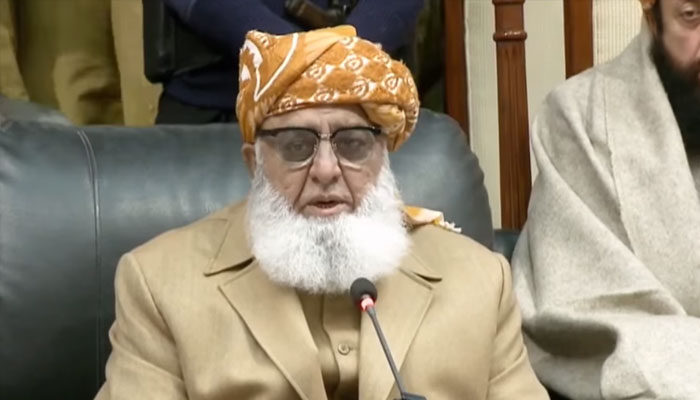Fake govt installed in KP to sideline JUI-F: Fazl
Only option available to us is to continue our political struggle, says JUI-F chief
PESHAWAR: Jamiat Ulema-e-Islam Fazl (JUIF) chief Fazlur Rahman Monday claimed that a fake government was installed in Khyber Pakhtunkhwa in the 2024 general election based on Form-47 like in the other parts of the country.
He made this assertion while speaking at an event organised to celebrate the party’s achievement in getting the ‘Madaris Amendment Bill’ signed into a law. He said through a fraudulent exercise, a fake government was brought into power to sideline the JUIF.
“But what should we do? Where should we go to seek justice? The only option available to us is to continue our political struggle,” he remarked.
Continuing his criticism of the general elections, he disclosed that a senior officer had met him a few months ago, raising hard questions about the party’s opposition to the military courts. “The officer argued that opposing military courts could lead to another May 9-like tragedy. I responded that if May 9 was such a tragedy, why was PTI rewarded with another term in Khyber Pakhtunkhwa? This so-called drama was staged to push back JUIF,” he said.
The JUIF chief urged the party workers and others present there to raise political awareness among the masses. He stressed that the West and anti-religious elements feared the political role of Muslim scholars more than the militant actions of certain groups.
“They know militants damage the true image of Islam, inadvertently serving the interests of these forces,” he said. He advised adopting a rational approach to political issues and avoiding the “double standards” of other political forces.
“Some condemn police actions at D-Chowk but enforce brutal measures against the local government representatives under their own rule,” he said, referring to the PTI. Discussing democracy and parliamentary politics, Fazl acknowledged the system’s flaws but emphasized the need for reform from within.
“Many questions can be raised, but abandoning the system isn’t an appropriate option. We must stay in the system and continue striving to improve it,” he urged. Regarding tensions in Kurram district, he said they were not purely sectarian but stemmed from deeper issues. “We understand the real causes and can resolve them. However, certain elements are determined to exploit the situation and let it exacerbate,” he added.
He disclosed that delegations from both sides had approached him for mediation. “The day we worked out a mechanism for resolution, riots erupted the very next day. Certain circles even sent messages discouraging settlement, as they prefer the situation to remain tense,” Fazl claimed.
Touching on the 26th Amendment, he alleged the government had concealed the final draft adding controversial provisions despite earlier deliberations. “We reviewed it, removed 34 objectionable sections out of the 56, and ensured the amendment became a part of the Constitution,” he said.
He criticised the presidency for delaying the provisions related to the seminaries. “We remained patient and steadfast, ultimately forcing the government to accept our stance and sign the amendment,” he stated.
The JUIF chief asserted that the state institutions and certain political forces harboured baseless fears of seminaries. “I am not against the contemporary education; I advocate simultaneous promotion of religious and modern education. The distinction between the two was created by the British, not religious scholars,” he concluded.
-
 Kanye West's Last Measure To Save Bianca Censori Marriage As He Tries To Salvage Image
Kanye West's Last Measure To Save Bianca Censori Marriage As He Tries To Salvage Image -
 Kim Kardashian Finally Takes 'clear Stand' On Meghan Markle, Prince Harry
Kim Kardashian Finally Takes 'clear Stand' On Meghan Markle, Prince Harry -
 Christina Applegate Makes Rare Confession About What Inspires Her To Keep Going In Life
Christina Applegate Makes Rare Confession About What Inspires Her To Keep Going In Life -
 Patrick J. Adams Shares The Moment That Changed His Life
Patrick J. Adams Shares The Moment That Changed His Life -
 Selena Gomez Getting Divorce From Benny Blanco Over His Unhygienic Antics?
Selena Gomez Getting Divorce From Benny Blanco Over His Unhygienic Antics? -
 Meet Arvid Lindblad: Here’s Everything To Know About Youngest F1 Driver And New Face Of British Racing
Meet Arvid Lindblad: Here’s Everything To Know About Youngest F1 Driver And New Face Of British Racing -
 At Least 30 Dead After Heavy Rains Hit Southeastern Brazil, 39 Missing
At Least 30 Dead After Heavy Rains Hit Southeastern Brazil, 39 Missing -
 Courtney Love Recalls How ‘comparison’ Left Marianne Faithfull ‘broken’
Courtney Love Recalls How ‘comparison’ Left Marianne Faithfull ‘broken’ -
 Pedro Pascal Confirms Dating Rumors With Luke Evans' Former Boyfriend Rafael Olarra?
Pedro Pascal Confirms Dating Rumors With Luke Evans' Former Boyfriend Rafael Olarra? -
 Ghost's Tobias Forge Makes Big Announcement After Concluding 'Skeletour World' Tour
Ghost's Tobias Forge Makes Big Announcement After Concluding 'Skeletour World' Tour -
 Katherine Short Became Vocal ‘mental Illness’ Advocate Years Before Death
Katherine Short Became Vocal ‘mental Illness’ Advocate Years Before Death -
 SK Hynix Unveils $15 Billion Semiconductor Facility Investment Plan In South Korea
SK Hynix Unveils $15 Billion Semiconductor Facility Investment Plan In South Korea -
 Buckingham Palace Shares Major Update After Meghan Markle, Harry Arrived In Jordan
Buckingham Palace Shares Major Update After Meghan Markle, Harry Arrived In Jordan -
 Demi Lovato Claims Fans Make Mental Health Struggle Easier
Demi Lovato Claims Fans Make Mental Health Struggle Easier -
 King Hospitalized In Spain, Royal Family Confirms
King Hospitalized In Spain, Royal Family Confirms -
 Japan Launches AI Robot Monk To Offer Spiritual Guidance
Japan Launches AI Robot Monk To Offer Spiritual Guidance




